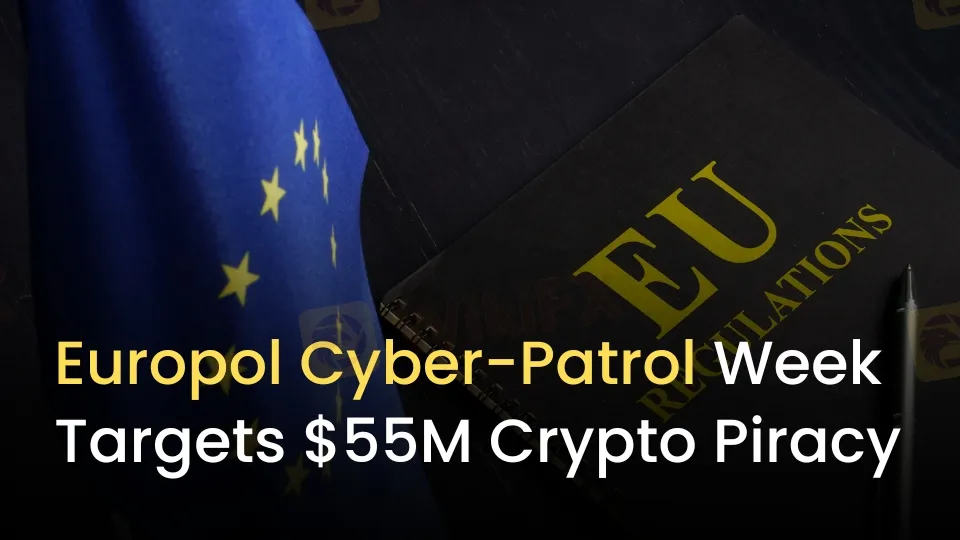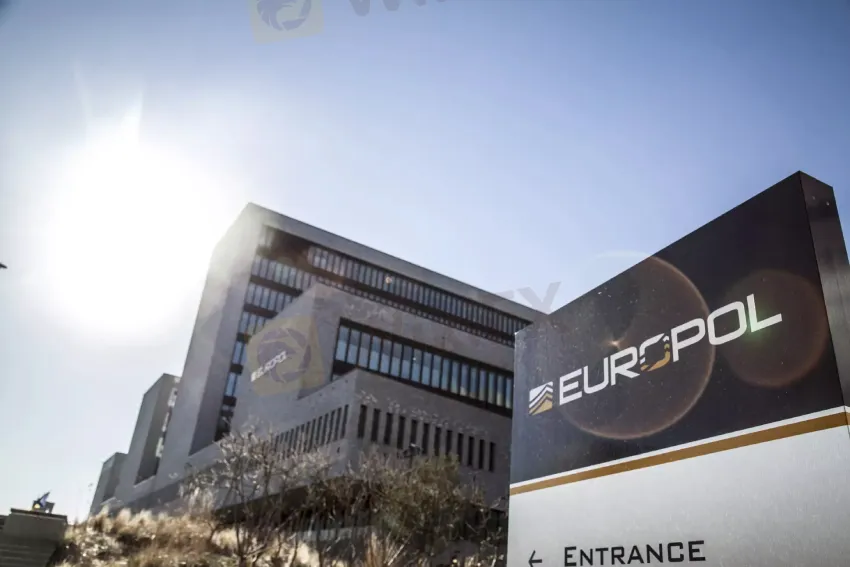Europol Cyber-Patrol Week Targets $55M Crypto Piracy
Abstract:Europol’s Cyber-Patrol Week exposed $55M in illicit crypto tied to IPTV piracy, disrupting sites and strengthening EU intellectual property enforcement.

Europol Cyber-Patrol Week Exposes Crypto-Powered Piracy
Between 10 and 14 November, Europol, the European Union Intellectual Property Office (EUIPO), and Spain‘s Policía Nacional coordinated a sweeping enforcement action against online intellectual property crime. The initiative, branded “Intellectual Property Crime Cyber-Patrol Week,” brought together 30 investigators at EUIPO’s Alicante headquarters. Using advanced Open-Source Intelligence (OSINT) and digital investigative tools, they mapped illicit services and traced financial flows hidden behind cryptocurrency transactions.
The scale of the operation was striking:
- 69 websites flagged for intellectual property infringement.
- 25 IPTV platforms referred to crypto service providers for disruption.
- 44 additional sites placed under ongoing investigation.
Collectively, these sites attracted an estimated 11.8 million annual visitors, underscoring the reach of illegal streaming and counterfeit content networks. Investigators tracked cryptocurrency flows worth USD 55 million (EUR 47 million) across accounts linked to these services, highlighting the financial backbone of modern piracy.

Criminals Turn to Cryptocurrency for Anonymity
A central theme of the Cyber-Patrol Week was the migration of criminal enterprises from traditional payment systems to cryptocurrency. Organisers noted that illicit operators increasingly rely on digital assets, believing them to provide anonymity.
Investigators countered this assumption with a novel tactic: purchasing services directly with cryptocurrency. This allowed them to trace transactions, identify operators, and flag accounts to partner organisations, including major exchanges and blockchain analytics firms.
By targeting the financial infrastructure of piracy, authorities struck at the core of criminal profitability. Shutting down crypto accounts not only disrupts revenue streams but also deters future operators who rely on perceived anonymity. Europol emphasised that this financial disruption is critical to safeguarding creators, legitimate businesses, and the wider economy.
International Cooperation Strengthens IP Enforcement
The Cyber-Patrol Week was more than an enforcement exercise—it was a platform for innovation and collaboration. Investigators developed actionable intelligence packages, shared best practices, and tested new technological solutions.
More than 15 countries and private-sector partners joined the initiative, pooling expertise to tackle illegal streaming and counterfeit distribution. This collaborative model reflects the European Unions broader commitment to a cross-border enforcement strategy, where cooperation and technology form the backbone of intellectual property protection.
The event reinforced the importance of public-private partnerships. By aligning enforcement agencies with crypto exchanges, cybersecurity firms, and rights holders, the EU is building a resilient framework to anticipate and neutralise emerging threats in the digital economy.
Conclusion
Europol‘s Cyber-Patrol Week demonstrates how coordinated enforcement, technological innovation, and financial disruption can reshape the fight against intellectual property crime. By exposing USD 55 million in illicit crypto flows and dismantling IPTV piracy networks, the operation highlights the EU’s determination to protect creators and strengthen trust in the digital marketplace.
Events like these signal a clear message: piracy may adapt, but so too will enforcement. With international collaboration and advanced investigative tools, intellectual property crime faces mounting pressure in Europes evolving digital landscape.

Read more

Cloudflare Outage Disrupts Broker Websites and Crypto Platforms
Cloudflare outage causes widespread disruption to broker websites and crypto platforms, highlighting risks in web infrastructure reliance.

Ponzi Scheme Operator Sentenced to 14 Years in Western Australia
Chris Marco, a Ponzi scheme operator, was sentenced to 14 years for a $34 million investment fraud in Western Australia. Read about the case and its impact.

Forex Broker Scams Surge Across Asia’s Trading Markets
Investment scams tied to fake forex brokers and crypto exchanges are rising in Asia, exploiting weak KYC rules and targeting cross-border investors.

Philippines Digital Fraud Crisis 2025: $8.29B Scam Losses Soar
The Philippines ranks 2nd globally in digital fraud with $8.29B annual losses. Government bans POGO, enacts laws, and fights rising scam calls in 2025.
WikiFX Broker
Latest News
Simulated Trading Competition Experience Sharing
WinproFx Regulation: A Complete Guide to Its Licensing and Safety for Traders
Interactive Brokers Expands Access to Taipei Exchange
Axi Review: A Data-Driven Analysis for Experienced Traders
INZO Regulation and Risk Assessment: A Data-Driven Analysis for Traders
Cleveland Fed's Hammack supports keeping rates around current 'barely restrictive' level
Delayed September report shows U.S. added 119,000 jobs, more than expected; unemployment rate at 4.4%
The CMIA Capital Partners Scam That Cost a Remisier Almost Half a Million
eToro Cash ISA Launch Shakes UK Savings Market
Is Seaprimecapitals Regulated? A Complete Look at Its Safety and How It Works
Rate Calc

